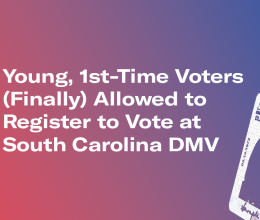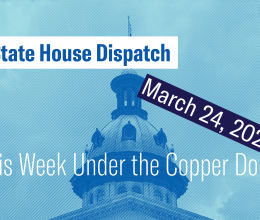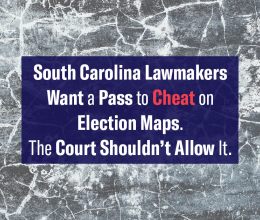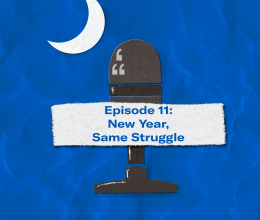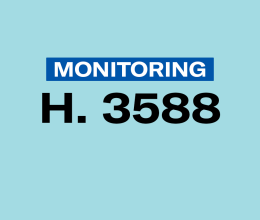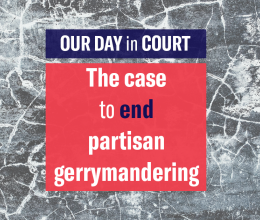
COLUMBIA — The South Carolina Supreme Court has dismissed a legal case brought by the League of Women Voters of South Carolina that challenged the practice of partisan gerrymandering. In a 5–0 opinion, the court held that the case presented a “nonjusticiable political question” and dismissed the claims brought in League of Women Voters of South Carolina v. Alexander.
“The League of Women Voters of South Carolina is disappointed that the South Carolina judiciary has held itself unable to protect the foundations of representative democracy in our state,” said Lynn Teague, vice president at the League of Women Voters of South Carolina. “Partisan gerrymandering is an attack on our most fundamental right as citizens, the right to vote. But the League of Women Voters of South Carolina will not stop fighting for fair redistricting. If a constitutional amendment is needed to protect voters, the people of South Carolina must demand that amendment.”
“I am proud of our case and, of course, gutted by this result,” said Allen Chaney, legal director of the American Civil Liberties Union of South Carolina. “Democracy relies on a careful balance of power between our three branches of government. By washing its hands of redistricting, the Court marks itself satisfied with the idea that politicians can game the system to retain their own power and ushers in an even greater entrenchment of political extremism.”
“This ruling sends the alarming message that partisan advantage may prevail over any sense of fair representation when it comes to drawing new district lines,” said Adriel I. Cepeda Derieux, deputy director of the ACLU’s Voting Rights Project. “By allowing those interests to outweigh the voices of South Carolina's voters, the Court has further weakened a basic principle of our democracy. Our work continues, both in the courts and alongside the people of South Carolina, until every community can be heard at the ballot box.”
“This decision is incredibly disappointing because it closes a door on constituents who seek relief from illegal partisan gerrymandering of congressional districts,” said Caren Short, director of legal and research at the League of Women Voters. “Political power belongs to the people, not politicians, and when that power is abused for political gain, voters deserve justice. The League will continue to fight for voters and residents in South Carolina and across the country.”
The facts of the case were not disputed. In a state where the Legislature controls the drawing of district maps, Republican leaders said repeatedly in the Statehouse, in the press, and in court that they had drawn the First Congressional District map, historically rooted in Charleston, to secure a partisan advantage for candidates in their party. In their own words, they sought to “pull the First red” and meet a specific goal for Republican vote share in the district. (For more information, see the ACLU-SC blog post “S.C. lawmakers admit they drew Congressional maps for partisan gain. We say that violates the State Constitution.”)
By opining that the case presented a “nonjusticiable political question,” the court indicated that the problem of partisan gerrymandering can only be addressed by the state legislature — the same body that gerrymandered the Congressional district map in the first place.
South Carolina politicians backed by the authoritarian State Freedom Caucus Network have already proposed redrawing South Carolina’s map so that all seven Congressional districts are safe for Republicans. The current 6–1 split is already gerrymandered and not reflective of voters’ party preferences. About 40% of South Carolina voters selected the Democratic candidate in the last presidential election. Ordinarily, redistricting happens once per decade following the Census, but now some politicians have proposed a mid-decade redistricting to secure a 7–0 map for Republicans.
In a 2019 opinion, Rucho v. Common Cause, the U.S. Supreme Court ruled 5–4 that while partisan gerrymandering may be “incompatible with democratic principles,” it was a “nonjusticiable political question.” Today the state Supreme Court also washed its hands of the question.
In a concurrence today, Chief Justice John Kittredge referred to the ongoing effort by majority parties in states including Texas and California to redistrict and secure greater partisan advantages. The Chief Justice wrote:
“[W]e are seeing — and will continue to see — state legislatures race to further minimize and perhaps erase the representation of the state's minority political party in Congress. These results may, indeed, be in line with each respective state's constitution and laws, but they collectively have the effect of diminishing our constitutional republic as a whole. This is a troubling prospect for those who adhere to our nation's founding principle that the People are sovereign. We can expect the current trend to continue unless the United States Supreme Court steps back into the fray.”
For more information on this case, including previous filings, see our case page for League of Women Voters of South Carolina v. Alexander.


